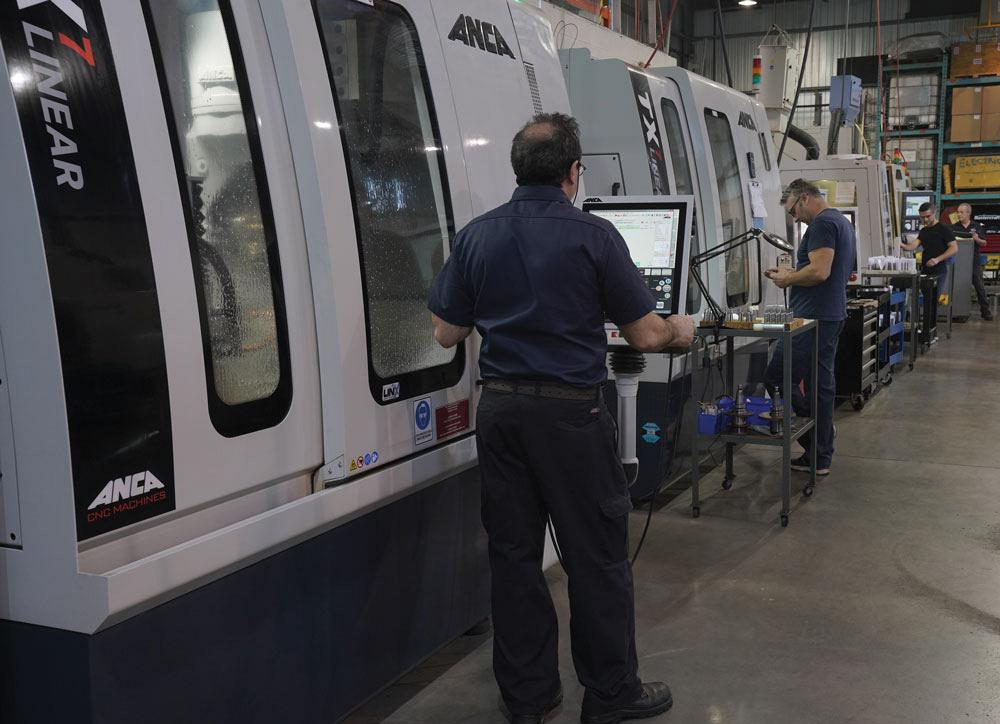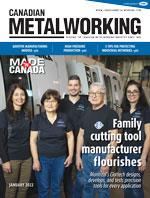Freelance Writer
- FMA
- The Fabricator
- FABTECH
- Canadian Metalworking
Family cutting tool manufacturer flourishes
Montreal’s Clortech designs, develops, and tests precision tools for every application
- By Mark Cardwell
- February 7, 2022
- Article
- Made In Canada
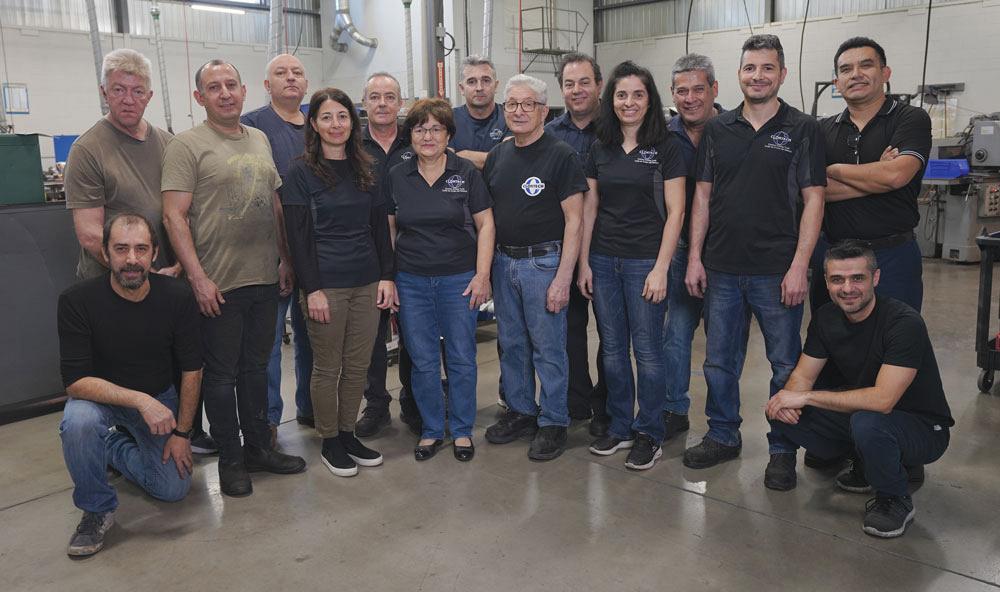
Shown here are (kneeling) Aram Abkarian, Abraham Tanashian (front row, from left) Hrant Sanossian, Emila Mattei, Carmela Mattei, Clorindo Mattei, Mena Mattei, and Patrick Mattei (back row, from left) Roger Goyette, Raffi Kaldenian, Jose Valdivia, Mircea Macicsan, Antonio Motile, Estuardo Aceituno, and Marco Robles.
A small family business that exports to the world. That’s how Patrick Mattei describes Clortech Precision Cutting Tools, a Montreal manufacturer of custom precision tools that sells its products to some of the biggest names in the aerospace, defense, rail, and automotive industries.
“We use our experience and equipment to make some really nifty cutting tools that our clients need and use to make high-precision mechanical parts,” said Patrick Mattei, Clortech’s vice-president of production and son of the company’s founder and president, Clorindo Mattei. “Shafts, gauges, broaches, bushings, extra-long reamers, special-diameter formed end mills, special contouring tools—you name it, we make it.”
Headquartered since 2003 in a 15,000-sq.-ft. plant that was custom-built to be a high-end metalworking plant, Clortech has roughly a dozen trained machinists who work in a large, open shop area that is equipped with CNC lathes, milling machines, cylindrical grinders, 14 tool and cutter grinders, five manual milling machines, four conventional lathes, and six 8-axis NC grinding machines built by ANCA (two TG7 Plus grinders, two TX7 machines, and two TX7 Linear machines).
“The machines allow us to dramatically increase our capacity by assigning multiple machines to each operator. By using this high-tech machine, we also are able to maintain a consistency with regards to tool quality and performance,” said Patrick. “They allow us to manufacture tools that we were not able to make with conventional machines.”
This last machine was added in 2018 as part of a $1.4 million investment in the business. More than $800,000 of that money came from the federal and Quebec governments, mostly in the form of repayable loans.
"As minister of Innovation, Science, and Economic Development, my goal is to help businesses grow and innovate so they can create good-quality jobs and wealth for Canadians,” said former Liberal cabinet member Navdeep Bains, whose portfolio in 2018 included responsibility for Canada’s six regional development agencies. “This is why we support businesses like Clortech, whose success reflects on the region, the aerospace industry, and the Canadian economy as a whole."
For her part, then-local Liberal provincial legislator Rita de Santis, who like Clorindo and his wife, Carmela, was born in Italy and emigrated to Canada, said the new ANCA machine would help to strengthen the manufacturing sector in the highly multicultural neighbourhood of Montreal North.
“This major project involving the acquisition of production equipment will definitely allow the company to put its best foot forward in order to remain competitive, increase its productivity, and help create jobs,” said de Santis. “I’m very pleased to announce Quebec's support for Clortech, a dynamic company that is an important contributor to Montreal's economy.”
As much as the new machine was an investment in Clortech’s future, the words of praise were a testament to the dedication, resilience, and success of the Mattei family in the challenging but promising business of manufacturing cutting tools for the metalworking industry.
From Cooking to Cutting
Though it was founded in 1987, the company’s roots really reach back 50 years to the time Clorindo quit his job as a cook in Montreal to go to work for his brother-in-law, who was making cutting tools for local businesses.
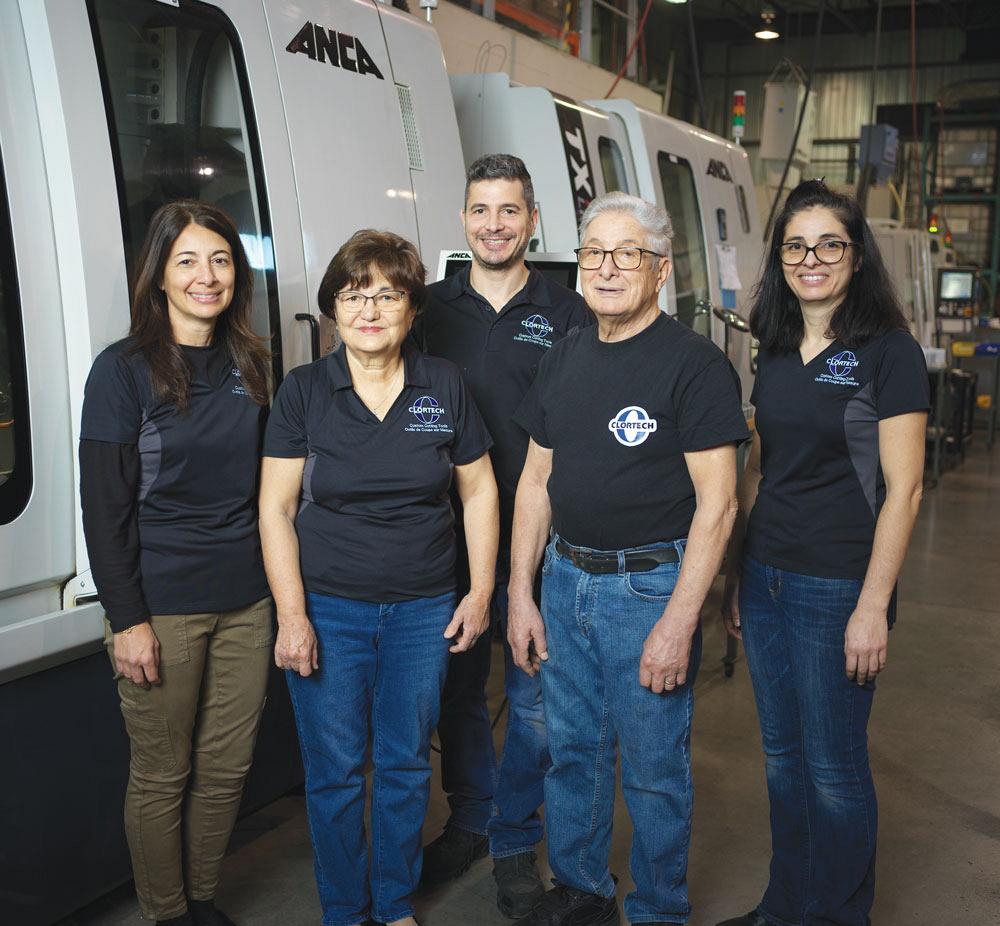
Clortech uses its experience and equipment to make cutting tools that its clients use to make high-precision mechanical parts.
“My dad only has a Grade 3 education,” said Patrick, who graduated with a Bachelor of Mechanical Engineering. He and his two sisters—Mena, who also graduated with a Bachelor of Engineering, and Emilia, a chemist and teacher—all work for the family firm. “But he is a very smart, hands-on kind of guy. He learned and mastered the trade on the fly.”
In the late 1970s Clorindo and a partner founded ICT Tools, which made specialty cutting tools in a small shop in the Montreal North neighbourhood. A decade later, however, he left the company to found Clortech.
The business was first located in a rented 2,100-sq.-ft. industrial building in the borough of Saint-Léonard, the centre of Italian culture in Montreal. According to Patrick, it was equipped with a disparate selection of used machines that his father had bought at local auctions and through bankruptcies.
“I remember he had one of everything: a lathe, milling machine, and a couple of tool and cutter grinders,” said Patrick, who started working for his padre at age 14. He learned the business literally from the ground up, performing tasks from sweeping floors and sandblasting to running the ever-growing number of machines, including the company’s first CNC machine, which went into operation in 1997.
Loyal Customers Followed the Family
The new business flourished from the get-go, he said, thanks to the steady stream of orders that came from loyal friends and customers—Pratt & Whitney and Rolls-Royce among them—that followed Clorindo to his new business.
“My dad was known in the industry as a top guy who made quality cutting tools on time,” said Patrick.
With the help of his mom, who handled the paperwork, and the three or four machinists who worked in the shop, Patrick said his dad orchestrated the company’s slow but steady growth as a specialty cutting tool manufacturer.
“My dad loves challenges, and he doesn’t take failure well,” he said. “If he puts his mind to something, he’ll get it done. He’s got a lot of drive, he’s very meticulous, and he’s a perfectionist. He won’t send a tool out the door that doesn’t meet his level of acceptance, which is extremely high.”
He added that his dad, now 78, was a tough shop master in the early years of Clortech.
“He would yell at me and others,” said Patrick, chuckling at the memory. “But he was under a lot of pressure, with a new business and a family to support. But he’s mellowed out over the years.”
Time to Move
As the business grew, the original shop became too small for the growing number of machines that were needed. So, in the early 1990s Clortech moved into a roomier, 4,700-sq.-ft. industrial building that Clorindo bought in nearby Montreal North.
The company stayed there until moving to its current location in a building that Clorindo constructed on a vacant lot.
“It was built specifically for what we do,” said Patrick, who joined the family company full time in 1999 after finishing his engineering degree at Concordia University. “It has extra lighting, smooth concrete floors, and white walls. It looks more like a lab than an industrial shop.”
In addition to the various machines in the large shop area, the building also features a large, climate-controlled quality control room where tools are measured using a variety of devices.
A Zoller Genius tool inspection machine allows both quick inspections of individual features and fully automatic, user-independent complete checks. Five optical comparators inspect small, manufactured parts using images that are magnified with lights, lenses, and mirrors to make 2D measurements.
The quality room is run by Mena Mattei, who joined the family firm in 2007 after working for Pratt & Whitney and Bombardier, where she tested aeronautical structures.
“She’s a lot like my dad,” said Patrick, who can handle every machine and do all the programming, though he now is more focused on managing the business and troubleshooting when production issues arise. “She can’t let something go without having her eyes and hands on it to make sure it’s perfect.”
Their father, he added, still works on the shop floor most days.
“He jumps in wherever and whenever he’s needed,” said Patrick. “He loves what he does—we all do. I think that’s our biggest strength as a family business.”
That passion, together with technical knowhow, experience, and a sterling reputation for quality work, has helped the Mattei family overcome major challenges over the years, many of them beyond their control in an industry and marketplace that are regularly buffeted by economic turbulence and technological changes.
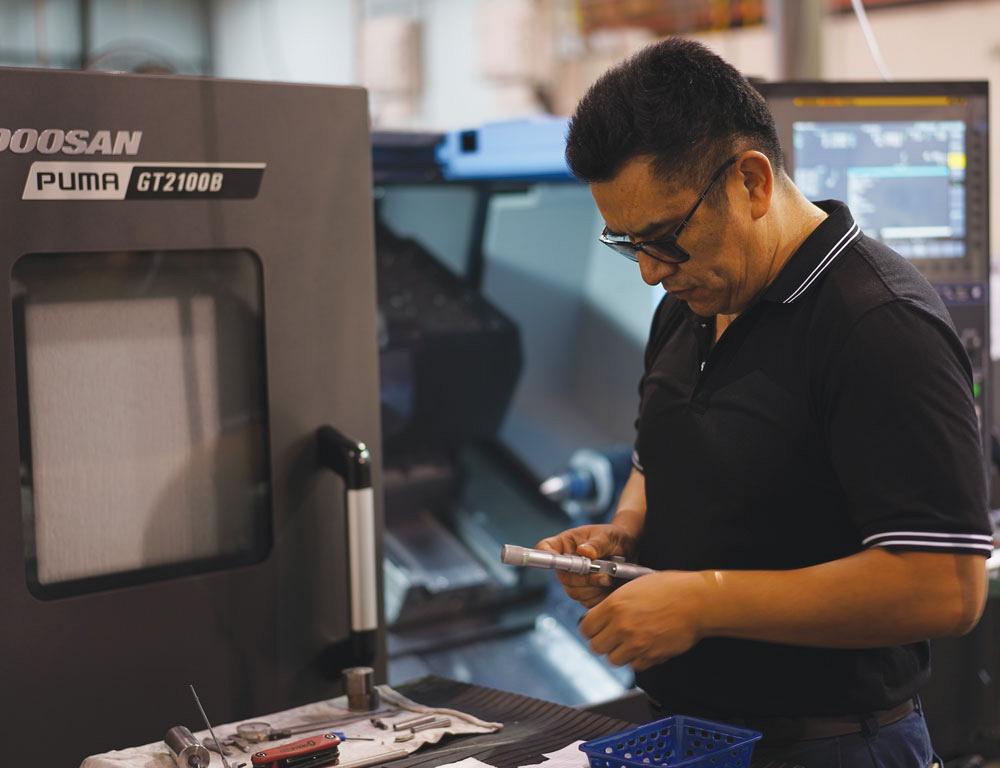
The company has implemented quality control procedures and rigorous inspections during and post-production to ensure a high level of quality.
Time to Diversify
The company’s original customer base—mostly aviation companies like Pratt & Whitney; Rolls-Royce; GE Aviation; and the Safran Group, which makes landing gear in Montreal—were hit hard by the terrorist attacks on Sept. 11, 2001, which resulted in massive losses and forever changed the passenger airline industry.
To soften the blow from the sudden drop in orders, Clortech turned to making cutting tools for the textile industry. The timing, however, was terrible, as China’s entry into the World Trade Organization in 2001 opened the floodgates to less-expensive, foreign-made clothing entering Quebec’s once-vibrant garment industry. It went into a tailspin from which it never recovered.
“The aeronautics industry started coming back, but then it got hit again in the 2008 economic crash,” said Patrick. “So we decided then to take a different approach and diversify our markets by approaching different industries.”
Clortech has spent the past decade making inroads into several new markets by offering customized, turnkey products for numerous applications.
The company’s extensive selection of high-performance holemaking tools, including drills and special end mills, helped it land contracts in the automotive industry, for example, notably with companies in Ontario and the Carolinas.
Similarly, it provides drills for rail and tie installers in the railroad industry. It also supplies the Canadian Armed Forces with tools (reaming, milling, and holemaking) to help in the maintenance and overhaul of tanks and other military equipment.
In addition to MRO tooling services, Clortech offers regrinding and reconditioning services to give old tools new life and provides kit inventory services to keep a stock of items for rapid turnaround times.
The company also offers what it calls a “360° Approach” tooling service for companies that lack the resources or workforce required to develop its own tools.
The company’s skilled tooling experts can design, develop, and test cutting tools for every application.
“With your desired parameter range--machining tool limitations--we can design effective tooling that meets your specific requirements. We rigorously test every tool in-house and can also provide a detailed 3D rendering for use in CAD/CAM simulators,” said Patrick.
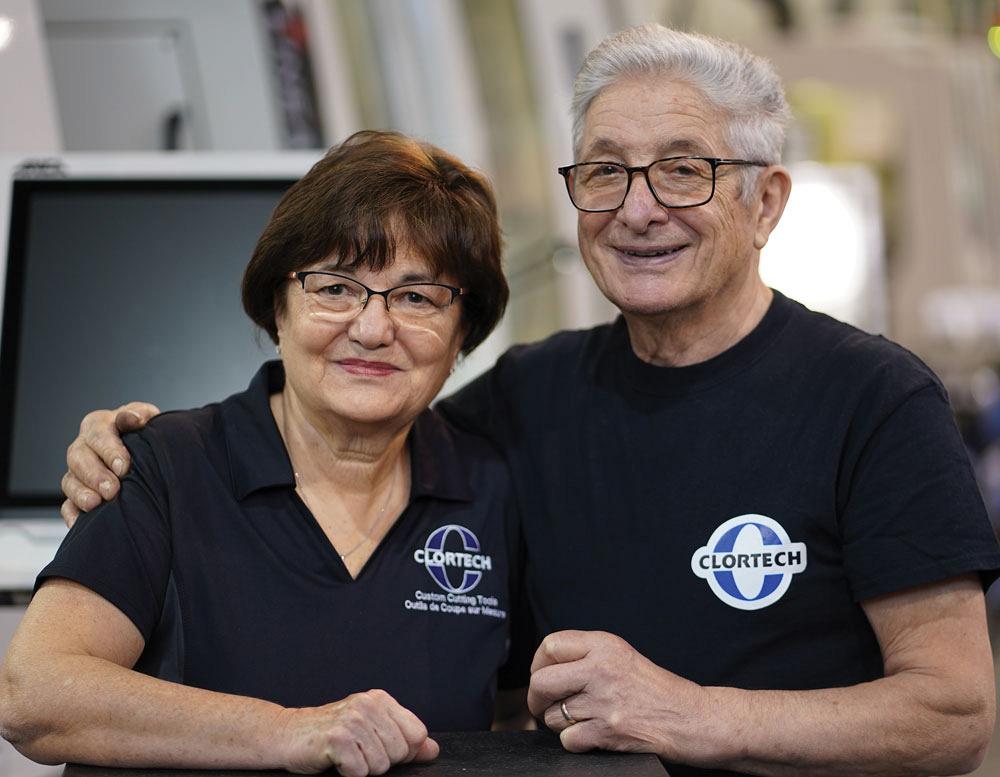
In the beginning, with Clorindo in the shop and Carmela helping with the paperwork of a growing business, Clortech grew thanks to loyal customers and family values.
For its oldest clientele, those in the aerospace industry, Clortech also offers an “AOG 911” service, which promises to make or modify tools within hours to help solve Aircraft on Ground problems by getting aircraft back into the air.
“We pride ourselves on our ability to offer comprehensive solutions that solve our clients’ most pressing needs,” said Patrick. “We have the experience and the ability to adapt to our clients’ specific requirements and offer them personalized services that range from full-service kits to flawless regrinds of tools.”
He added that as a custom tool manufacturer, Clortech is able to produce custom tools to exact specifications to meet clients’ needs for specific metalworking or industrial applications.
“No matter the industry, we can, and do, design and produce solutions that work,” said Patrick. “We implement 100 per cent quality control procedures and rigorous inspections during and post-production to ensure the superior level of quality that our clients have come to expect.”
Skilled Labour Shortages
Despite the company’s success, he said it still faces challenges going forward, including finding skilled machinists.
“It’s a nightmare,” he said. “There literally are zero candidates available who come out of the trade schools. They are being scooped up by the multinationals and other big competitors. Competition is ferocious.”
He said the biggest source of labour power these days are new immigrants to Canada who have work experience in the metalworking trade.
“We’re like a mini United Nations here,” quipped Patrick. “We’ve got people from Italy, Spain, Romania, Syria, Bolivia, and Guatemala. And being in a multicultural neighbourhood like Montreal North makes it easier for them to settle.”
Though he would like to see his family’s business continue to grow, Patrick said its future is currently at a crossroads.
“A business is like a child: it goes through cycles and stages and ups and downs, both business-wise and emotionally. Right now, we’re at a teenage stage,” he added. “We’re thinking about growing, but how do you do it? Do you do it through acquisition or organically by going after big new contracts? But that means adding new equipment and the need to troubleshoot all the time. But we’re already working harder than ever. We’ll see what the future brings. For now, though, business is great. And we’re very happy and proud of what we’ve achieved.”
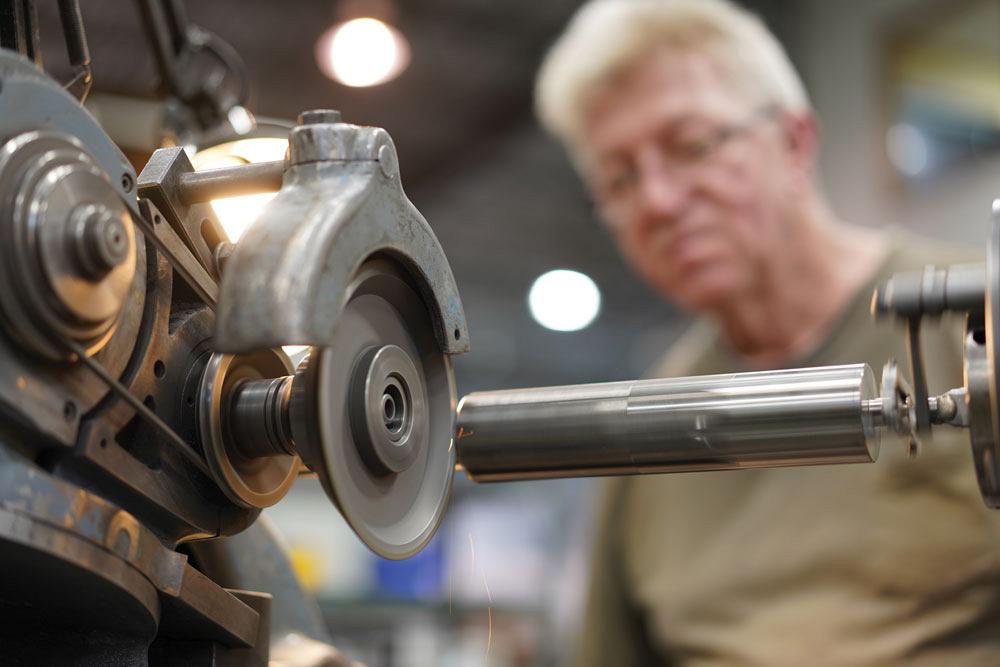
The company creates a selection of high-performance holemaking tools, including drills and special end mills.
All photos courtesy of Absed.com
Contributing writer Mark Cardwell can be reached at m.cardwell@videotron.ca.
Clortech Precision Cutting Tools, www.clortech.com
About the Author
Related Companies
subscribe now


Keep up to date with the latest news, events, and technology for all things metal from our pair of monthly magazines written specifically for Canadian manufacturers!
Start Your Free Subscription- Trending Articles
Automating additive manufacturing

Sustainability Analyzer Tool helps users measure and reduce carbon footprint

CTMA launches another round of Career-Ready program

Sandvik Coromant hosts workforce development event empowering young women in manufacturing

GF Machining Solutions names managing director and head of market region North and Central Americas

- Industry Events
MME Winnipeg
- April 30, 2024
- Winnipeg, ON Canada
CTMA Economic Uncertainty: Helping You Navigate Windsor Seminar
- April 30, 2024
- Windsor, ON Canada
CTMA Economic Uncertainty: Helping You Navigate Kitchener Seminar
- May 2, 2024
- Kitchener, ON Canada
Automate 2024
- May 6 - 9, 2024
- Chicago, IL
ANCA Open House
- May 7 - 8, 2024
- Wixom, MI













